牛津译林版八年级下册 Unit 4 A good read Grammar课件 (共18张PPT)
文档属性
| 名称 | 牛津译林版八年级下册 Unit 4 A good read Grammar课件 (共18张PPT) |
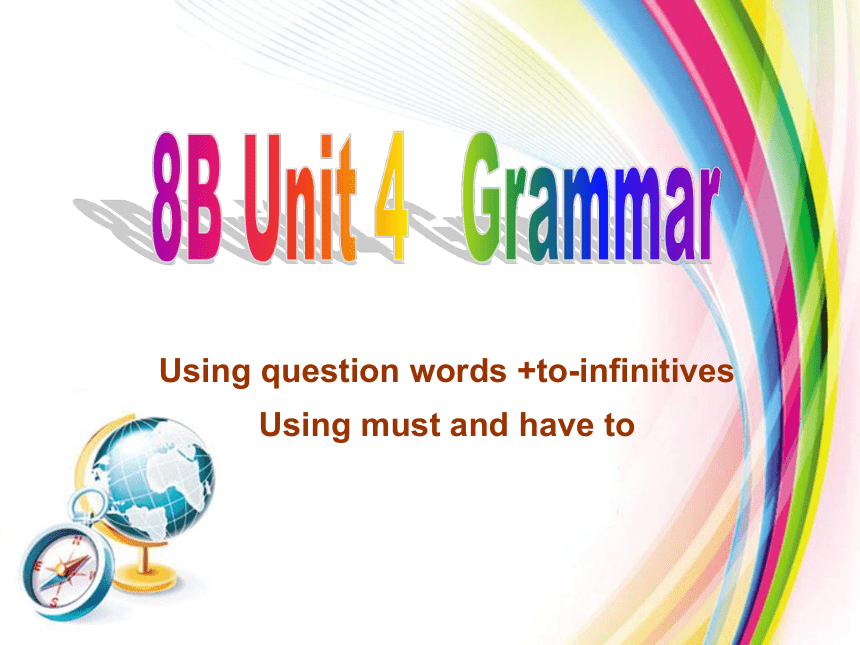
|
|
| 格式 | zip | ||
| 文件大小 | 312.9KB | ||
| 资源类型 | 教案 | ||
| 版本资源 | 牛津译林版 | ||
| 科目 | 英语 | ||
| 更新时间 | 2022-08-13 20:48:36 | ||
图片预览

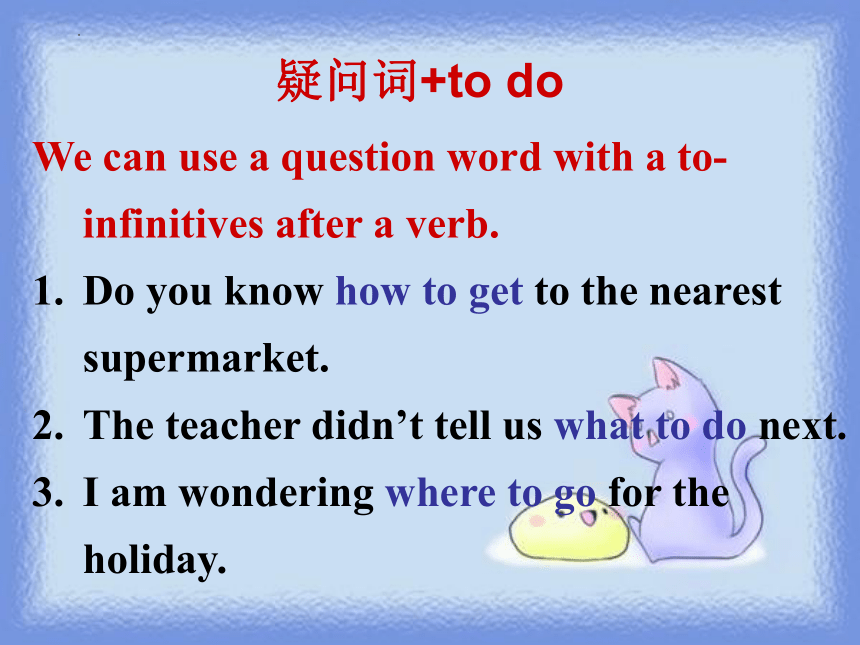
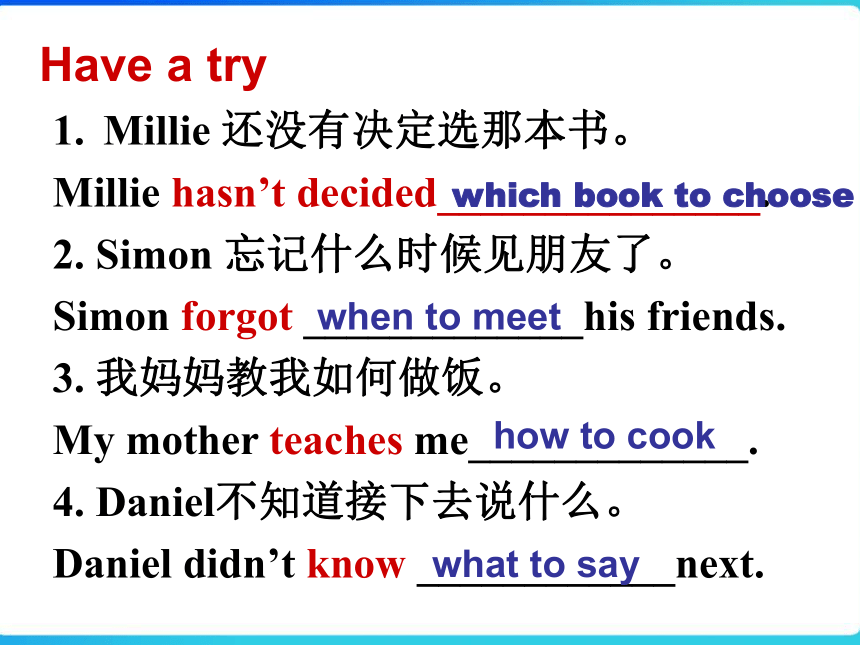
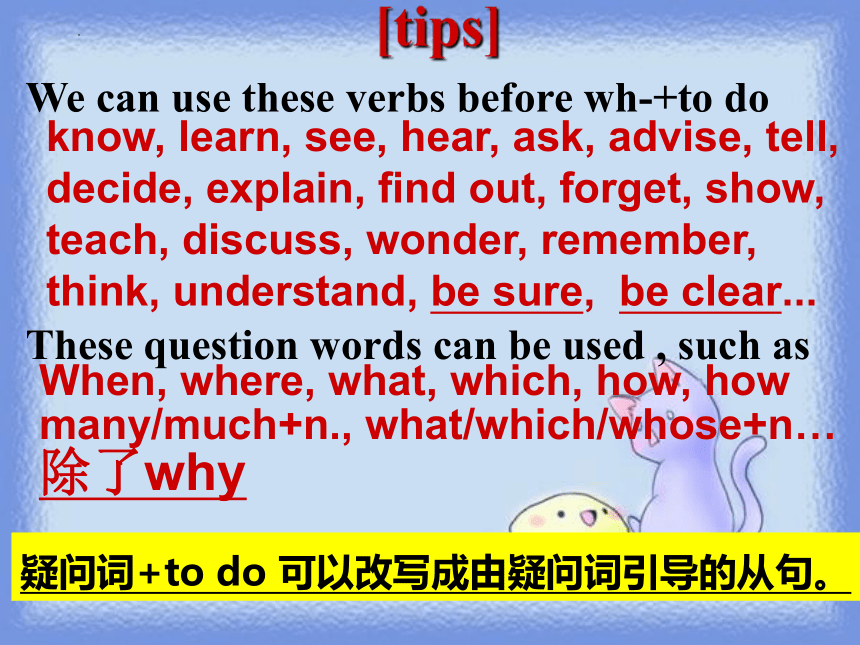
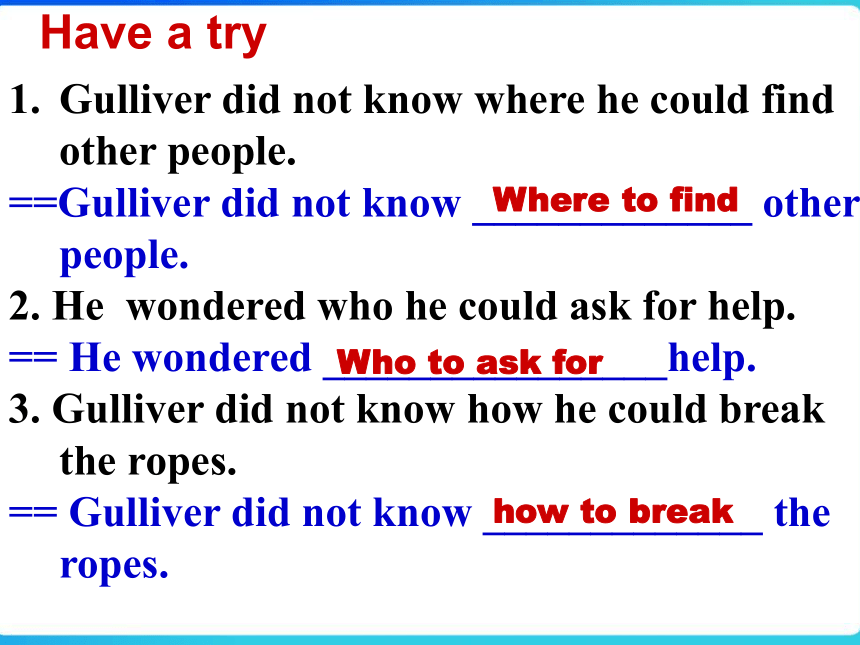
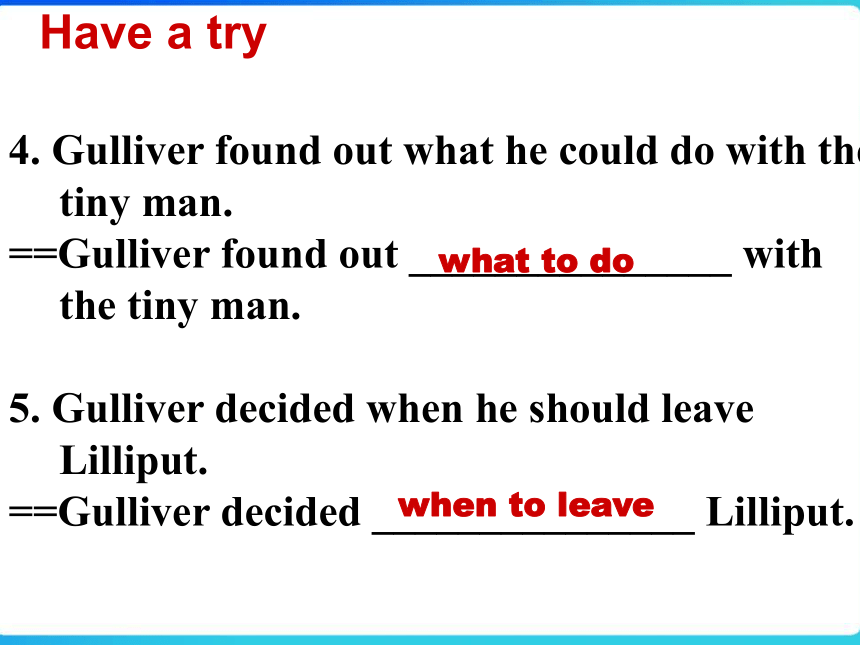
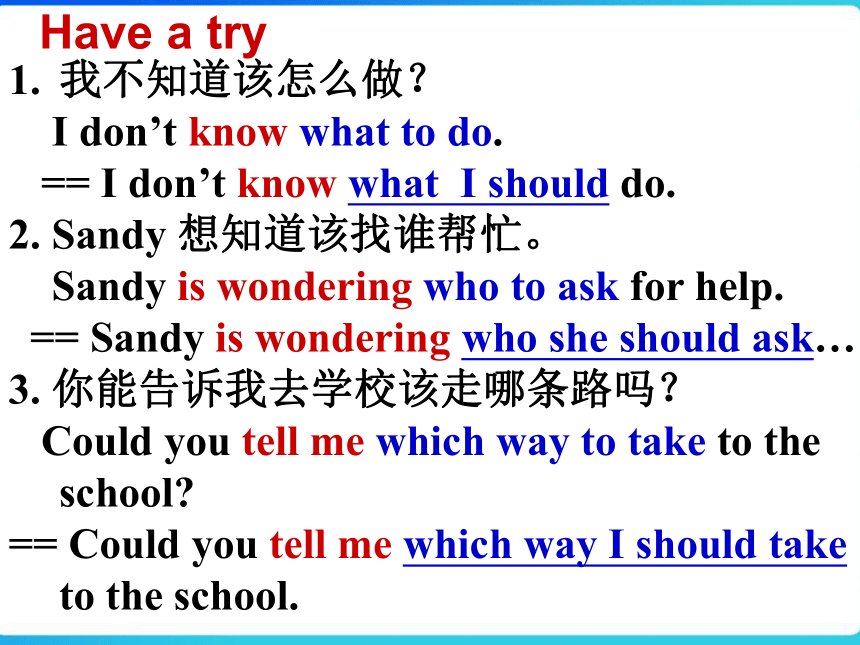
文档简介
(共18张PPT)
Using question words +to-infinitives
Using must and have to
8B Unit 4 Grammar
We can use a question word with a to-infinitives after a verb.
Do you know how to get to the nearest supermarket.
The teacher didn’t tell us what to do next.
I am wondering where to go for the holiday.
疑问词+to do
Millie 还没有决定选那本书。
Millie hasn’t decided_______________.
2. Simon 忘记什么时候见朋友了。
Simon forgot _____________his friends.
3. 我妈妈教我如何做饭。
My mother teaches me_____________.
4. Daniel不知道接下去说什么。
Daniel didn’t know ____________next.
Have a try
which book to choose
when to meet
how to cook
what to say
[tips]
We can use these verbs before wh-+to do
These question words can be used , such as
know, learn, see, hear, ask, advise, tell, decide, explain, find out, forget, show, teach, discuss, wonder, remember, think, understand, be sure, be clear...
When, where, what, which, how, how many/much+n., what/which/whose+n…
除了why
疑问词+to do 可以改写成由疑问词引导的从句。
Gulliver did not know where he could find other people.
==Gulliver did not know _____________ other people.
2. He wondered who he could ask for help.
== He wondered ________________help.
3. Gulliver did not know how he could break the ropes.
== Gulliver did not know _____________ the ropes.
Have a try
Where to find
Who to ask for
how to break
4. Gulliver found out what he could do with the tiny man.
==Gulliver found out _______________ with the tiny man.
5. Gulliver decided when he should leave Lilliput.
==Gulliver decided _______________ Lilliput.
Have a try
what to do
when to leave
我不知道该怎么做?
I don’t know what to do.
== I don’t know what I should do.
2. Sandy 想知道该找谁帮忙。
Sandy is wondering who to ask for help.
== Sandy is wondering who she should ask…
3. 你能告诉我去学校该走哪条路吗?
Could you tell me which way to take to the school
== Could you tell me which way I should take to the school.
Have a try
4. 吴老师建议我们选择哪些课外活动。
Mr Wu advised us which to choose as after-school activities.
==Mr Wu advised us which we should choose as after-school activites.
5. 不要忘了告诉你妈妈什么时候接你。
Don’t forget to tell your mother when to pick you up.
==Don’t forget to tell your mother when she should pick you up.
Have a try
6. 我不确定带多少钱.
I am not sure how much money to take.
==I’m not sure how much money I should take.
7. 那时他清楚可以走哪条路吗?
Was he clear which way to take
==Was he clear which way he could take
8. 他的问题是如何学好英语。
His question is how to learn English well.
9. 选读什么书对我们很重要。
Which books to choose to read is important for us.
We must obey school rules when we’re at school. What school rules do we have What must we do What mustn’t we do
We must wear school uniforms.
We must get to school on time.
We must hand in our homework on time.
…
We use must when the speaker feels that something is necessary.
What must we do
We must not throw rubbish on the ground.
We must not run fast in the teaching buildings.
We use must not to say that something is not allowed.
must not =mustn’t
What mustn’t we do
I have to call my parents.
I have to ask for leave and stay at home.
…
We use have to when the situation makes something necessary.
has to , had to, will have to…
If you are ill and the doctor asks you stay at home, what will you have to do
I don’t have to finish my homework today.
I don’t have to have the rest lessons today.
We use do not have to to say that it is not necessary to do something.
do not have to = don’t have to
Doesn’t have to, didn’t have to, won’t have to,…
If you are ill and the doctor asks you stay at home, what won’t you have to do
(1)must表示“必须”,“应该”。
否定式must not (mustn‘t) 表示“不应该”,“不许可”,“不准”,“禁止”等。
在回答带有must的问句时,否定式常用need not (needn’t) 或 don't have to 表示“不必”,而不用must not (mustn't)
Draw a conclusion
1.你不能那样说。
You mustn't speak like that.
2. 8点之前我必须回家吗?是的,必须回家。/不,不必了.
Must I be home before eight o‘clock
Yes, you must.
/No, you needn't./No, you don't have to.
2)must表推测, 一般只用于肯定句中,译成汉语“一定”,“必定”。
其否定形式常用can not而不用must not。
1. 肯定有一些错误。
There must be some mistakes.
2. 你一定很累了。
You must be very tired.
3. 他肯定不在家,他去了香港。
He can’t be at home. He has gone to Hong Kong.
(3)have to表示“必须”,“不得不”,表示的却是客观需要。但must表示的是说话人的主观看。
have to 有更多的时态形式:现在时,过去时,将来时等,而must只有现在时形式。
1.他得走了。
He has to go.
2. 为了提高英语你们得更加努力地学习。
You will have to study harder to improve your English.
3. 他必须按照他们所做的做。
He must do what they did.
Let’s work out some class rules using must, mustn’t, have to, don’t have to
Write them down in your paper.
Work in groups
Using question words +to-infinitives
Using must and have to
8B Unit 4 Grammar
We can use a question word with a to-infinitives after a verb.
Do you know how to get to the nearest supermarket.
The teacher didn’t tell us what to do next.
I am wondering where to go for the holiday.
疑问词+to do
Millie 还没有决定选那本书。
Millie hasn’t decided_______________.
2. Simon 忘记什么时候见朋友了。
Simon forgot _____________his friends.
3. 我妈妈教我如何做饭。
My mother teaches me_____________.
4. Daniel不知道接下去说什么。
Daniel didn’t know ____________next.
Have a try
which book to choose
when to meet
how to cook
what to say
[tips]
We can use these verbs before wh-+to do
These question words can be used , such as
know, learn, see, hear, ask, advise, tell, decide, explain, find out, forget, show, teach, discuss, wonder, remember, think, understand, be sure, be clear...
When, where, what, which, how, how many/much+n., what/which/whose+n…
除了why
疑问词+to do 可以改写成由疑问词引导的从句。
Gulliver did not know where he could find other people.
==Gulliver did not know _____________ other people.
2. He wondered who he could ask for help.
== He wondered ________________help.
3. Gulliver did not know how he could break the ropes.
== Gulliver did not know _____________ the ropes.
Have a try
Where to find
Who to ask for
how to break
4. Gulliver found out what he could do with the tiny man.
==Gulliver found out _______________ with the tiny man.
5. Gulliver decided when he should leave Lilliput.
==Gulliver decided _______________ Lilliput.
Have a try
what to do
when to leave
我不知道该怎么做?
I don’t know what to do.
== I don’t know what I should do.
2. Sandy 想知道该找谁帮忙。
Sandy is wondering who to ask for help.
== Sandy is wondering who she should ask…
3. 你能告诉我去学校该走哪条路吗?
Could you tell me which way to take to the school
== Could you tell me which way I should take to the school.
Have a try
4. 吴老师建议我们选择哪些课外活动。
Mr Wu advised us which to choose as after-school activities.
==Mr Wu advised us which we should choose as after-school activites.
5. 不要忘了告诉你妈妈什么时候接你。
Don’t forget to tell your mother when to pick you up.
==Don’t forget to tell your mother when she should pick you up.
Have a try
6. 我不确定带多少钱.
I am not sure how much money to take.
==I’m not sure how much money I should take.
7. 那时他清楚可以走哪条路吗?
Was he clear which way to take
==Was he clear which way he could take
8. 他的问题是如何学好英语。
His question is how to learn English well.
9. 选读什么书对我们很重要。
Which books to choose to read is important for us.
We must obey school rules when we’re at school. What school rules do we have What must we do What mustn’t we do
We must wear school uniforms.
We must get to school on time.
We must hand in our homework on time.
…
We use must when the speaker feels that something is necessary.
What must we do
We must not throw rubbish on the ground.
We must not run fast in the teaching buildings.
We use must not to say that something is not allowed.
must not =mustn’t
What mustn’t we do
I have to call my parents.
I have to ask for leave and stay at home.
…
We use have to when the situation makes something necessary.
has to , had to, will have to…
If you are ill and the doctor asks you stay at home, what will you have to do
I don’t have to finish my homework today.
I don’t have to have the rest lessons today.
We use do not have to to say that it is not necessary to do something.
do not have to = don’t have to
Doesn’t have to, didn’t have to, won’t have to,…
If you are ill and the doctor asks you stay at home, what won’t you have to do
(1)must表示“必须”,“应该”。
否定式must not (mustn‘t) 表示“不应该”,“不许可”,“不准”,“禁止”等。
在回答带有must的问句时,否定式常用need not (needn’t) 或 don't have to 表示“不必”,而不用must not (mustn't)
Draw a conclusion
1.你不能那样说。
You mustn't speak like that.
2. 8点之前我必须回家吗?是的,必须回家。/不,不必了.
Must I be home before eight o‘clock
Yes, you must.
/No, you needn't./No, you don't have to.
2)must表推测, 一般只用于肯定句中,译成汉语“一定”,“必定”。
其否定形式常用can not而不用must not。
1. 肯定有一些错误。
There must be some mistakes.
2. 你一定很累了。
You must be very tired.
3. 他肯定不在家,他去了香港。
He can’t be at home. He has gone to Hong Kong.
(3)have to表示“必须”,“不得不”,表示的却是客观需要。但must表示的是说话人的主观看。
have to 有更多的时态形式:现在时,过去时,将来时等,而must只有现在时形式。
1.他得走了。
He has to go.
2. 为了提高英语你们得更加努力地学习。
You will have to study harder to improve your English.
3. 他必须按照他们所做的做。
He must do what they did.
Let’s work out some class rules using must, mustn’t, have to, don’t have to
Write them down in your paper.
Work in groups
